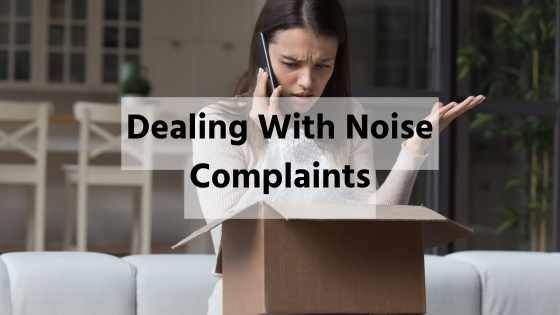Dealing With Noise Complaints
Key Takeaways:
-
Differentiate Between Normal and Excessive Noise: Understand the difference between everyday living sounds and disruptive behavior to assess complaints accurately.
-
Conduct On-Site Evaluations: Visiting the property yourself can help determine whether a complaint is valid and how serious the issue is.
-
Implement Soundproofing Measures: Upgrades like double-pane windows, insulation, and noise-absorbing materials can reduce ongoing complaints.
-
Communicate and Educate Tenants: Clear communication and tenant education about noise policies help create a more respectful and peaceful environment.
As a landlord, you have a great deal of responsibility after establishing a lease with a tenant. And among these responsibilities is ensuring the tenant can enjoy their rented premises in peace and quiet.
And part of that responsibility also means being able to respond promptly after getting notified of a noise complaint by the tenant.
Unfortunately, if you’re a newbie landlord, you may not know what appropriate steps to take when faced with a noise complaint.
That’s why, at IPM Property Management, we’ve put together this blog to walk you through everything you need to know. Keep reading to learn more!
Tips on How to Deal with Noise Complaints
Do Your Research
Once you receive a noise complaint from a tenant, do due diligence first. The goal here is to determine whether the complaint is valid or not. It’s possible that it may be based on unreasonable expectations by the tenant.
Generally, noise can be categorized into two types. That is, normal, everyday sound levels and “excessive” levels. As a landlord, being able to distinguish between the two types is key for a smooth landlord-tenant relationship.

On the other hand, excessive noise is the kind that goes beyond the normal expectations of apartment living.
These include: loud music or parties, continuous pet noise, construction work outside permitted hours, and repeated stomping, running, or jumping.
Effective tenant screening can help reduce these issues by identifying renters who are more likely to respect community rules and maintain a peaceful environment.
Visit the Property Yourself
As a landlord, addressing tenant complaints quickly is essential in ensuring tenant satisfaction. After receiving the complaint, visit the property to actively listen to the tenant’s concerns. This is especially true if you have received a few complaints on the same.
But, how exactly will you be able to evaluate a noise complaint? You’ll need to consider a few factors. Ask yourself the following questions for a clearer picture.
- How many noise complaints have you received recently? If you have received multiple complaints about the tenant causing the noise, then you’d need to act.
- Can you hear the noise yourself after visiting the property? Getting a firsthand experience will give you a sense of the situation.
- Is there any official documentation of the noise? This can help add further evidence to the complaint.
- Does the noise meet the “excessive” level criteria? Distinguishing between what constitutes normal- and excessive noise is key to a fair resolution. This will help you delineate between noises that are reasonable and excessive.

Reach a Conclusion
You can only have one of two outcomes after you visit the property. That is, either the complaint is valid or not.
Also, the tenant may feel unappreciated and grow increasingly frustrated. Resultantly, they may want to move out at the first opportunity they get.
For the tenant causing the noise complaint, refer them to your quiet hours policy. Remind them that it’s a violation of the lease terms and that could lead to their eviction if they don’t stop it.
If the complaint involves an upstairs neighbor, you may consider coming up with some non-invasive ways to help deal with the noise. You could consider:
- Making upgrades to the flooring. Go for choices that help absorb noise before it travels to the tenant beneath them. Good options include cork and carpet. You can also help reduce the screeching of chairs by adding inexpensive adhesive pads to each chair leg.
- Installing double-pane windows or hanging heavy drapes around the windows.
- Adding extra wall insulation to provide a bit more noise insulation.
- Asking tenants in the top stories to exercise some caution when closing doors and cabinets.

For invalid noise complaints, you may want to talk to the concerned tenants to calm them down. Explain to them that the noise was reasonable and didn’t violate the quiet hours policy. But even if it had violated it, let them know that you’ve reached an agreement with the tenant, and it won’t happen again.
Establish Quiet Hours
As a landlord, this cannot be emphasized enough. It is the surest way to minimize tenant complaints by specifying the details of the quiet hours.
Simply put, the quiet hours are the periods during which tenants should be considerate of their noise levels. Generally speaking, this period usually runs between 10 P.M. to 7 A.M. and from 10 P.M. to 9 A.M. during weekdays and weekends, respectively. This, however, doesn’t mean that your tenants have a right to make excessive noise at other times.
You may also want to specify what exactly constitutes “excessive noise” during this time. For example, blaring music, shouting, excessive audio sounds, noisy power tools, construction noises, and repeated heavy footsteps, jumping, or dropping heavy objects.
Some cities and towns usually have laws in place that specify what examples constitute quiet hours. As such, make sure to familiarize yourself with any applicable laws in this regard.
Rent to Quality Tenants
Your best bet against difficult tenants is having great tenants. Great tenants abide by the terms of the lease, pay rent on time, report issues on time, and renew their leases multiple times.
To maximize your chances of landing a tenant of such caliber, make sure to conduct a proper screening process. Require all prospective tenants to fill out a rental application form and provide certain vital information, including details about their rental history, criminal background, employment background, income level, and credit card score.
Bottom Line
Certain things are necessary for being a successful landlord. Including renting to the right tenant and having solid policies in place. If you’re struggling with any of these things, hiring a property manager may be critical.
IPM Property Management can provide you with a stress-free and profitable property management experience in Chico. Get in touch to learn more!

